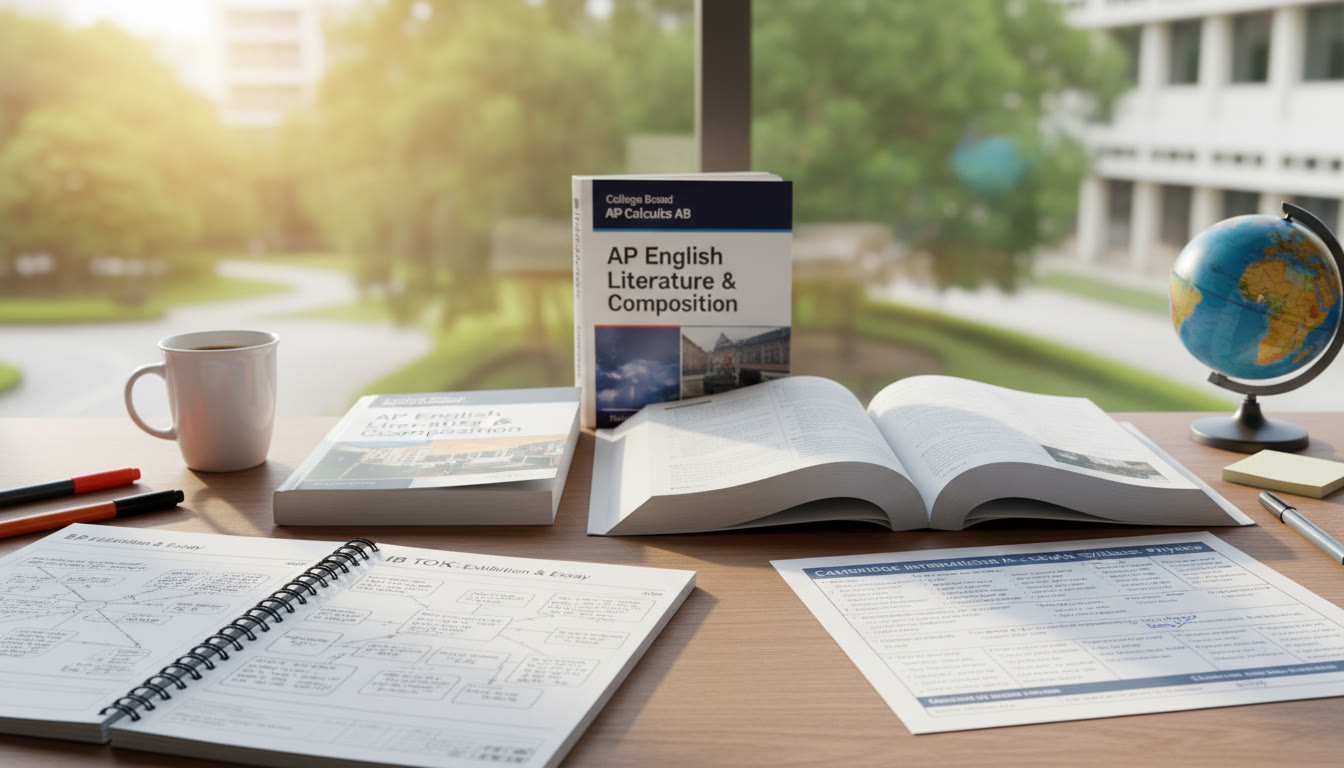AP + A-Levels/IB: Crafting a Strong Mixed Profile for UCAS Success
Crossing educational systems can feel like walking across two different maps: the terrain is familiar, but the landmarks have different names. If you’re a student combining AP courses with A-Levels or the IB Diploma — or a parent supporting one — this guide is made for you. We’ll translate policy into practice, confusion into a clear plan, and anxiety into actionable next steps, all with real-world examples and an eye toward what top UK universities look for on UCAS.

Why Mixed Profiles Work — And When They Shine
Universities in the United Kingdom evaluate students holistically but with a strong focus on academic rigour and subject fit. Mixing APs with A-Levels or IB can be an advantage when done thoughtfully: APs can demonstrate breadth and initiative; A-Levels or IB give depth and evidence of preparedness for specific degree requirements.
Consider these strengths of mixed profiles:
- Breadth and depth. APs allow you to explore additional subjects beyond your core A-Level or IB choices — useful if you’re undecided or want to show interdisciplinary strength.
- Contextual fit. A-Levels and IB are well understood by UCAS admissions teams; APs add international context and can confirm mastery in particular topics.
- Flexibility for US/UK pathways. If you’re applying to both systems (or keeping options open), a mixed profile keeps doors open without diluting depth.
When mixed profiles may be risky
- If APs replace required A-Level subjects for a UK course that expects specific content (for example, many science and engineering programs expect A-Level Mathematics and Further Mathematics).
- If APs are taken at the expense of predicted A-Level/IB performance — universities place heavy weight on predicted grades.
- When your schedule becomes too fragmented: universities prefer consistent academic focus over scattered extracurriculars.
Understand What UCAS and UK Universities Care About
Admissions tutors primarily seek evidence of ability to succeed in the chosen degree. That evidence comes from several places: academic record (including predicted grades), subject relevance, personal statement, reference, and — for some programs — admissions tests or interviews.
Key takeaways:
- Predicted grades matter. Strong AP scores are great, but for UK applications, predicted A-Level or IB grades remain a primary signal.
- Subject relevance beats quantity. Admissions tutors prefer fewer subjects studied in depth (e.g., three A-Levels) than many shallow ones.
- Evidence trumps claims. Use AP exam results, coursework, olympiad awards, or extended essays to demonstrate competence.
Practical Roadmap: How to Build Your Mixed Profile
Here’s a step-by-step plan you can use from Years 11–13 (or equivalent):
1. Start with your target course
Decide the degree you want to apply for and read typical entry requirements. If you haven’t chosen a course, shortlist 3–5 closely related subjects so you can align A-Levels/IB subjects accordingly.
2. Choose core subjects for depth
Prioritize A-Levels or IB subjects that match your intended degree. These give you the depth UK tutors expect. APs should be supplementary — not replacement — unless you have clear evidence that the AP content is accepted in lieu of an A-Level.
3. Use APs for complement and evidence
AP courses are valuable when they:
- Show additional strength (e.g., AP Calculus when you’re taking A-Level Mathematics).
- Cover niche topics that align with a course (e.g., AP Computer Science for a computing application).
- Provide strong, externally graded proof if you earn a 4 or 5.
4. Maintain predicted grade focus
Don’t sacrifice A-Level or IB performance chasing extra APs. A predicted A*AA (for example) will often matter more than having many APs with mixed performance.
5. Build a coherent personal statement story
Your statement should knit A-Levels/IB and APs into a single narrative: explain how each informed your interests, projects, or subject mastery. Use concrete examples — an AP research project that inspired an extended essay, or A-Level lab work that confirmed your passion for chemistry.
Examples: Mixed Profiles That Worked
Context helps. Here are three hypothetical but realistic profiles and why they’d appeal on UCAS.
| Profile | Subjects | Why it works |
|---|---|---|
| STEM Focus | A-Level Math, Physics, Chemistry + AP Calculus AB + AP Physics 1 | Depth in core A-Levels with APs providing additional evidence of quantitative ability and standardized achievement. |
| Humanities Blend | IB HL English, History + AP Psychology + AP European History | IB HL demonstrates depth and critical thinking; APs add topical breadth and exam-proven skills. |
| Interdisciplinary | A-Level Biology, Geography + AP Statistics + Extended Project Qualification (EPQ) | Shows scientific method, data literacy, and independent research — attractive for environmental science or ecology courses. |
Nailing the Personal Statement
The personal statement is where your mixed profile becomes a story. Admissions tutors read hundreds of statements; yours should be specific, reflective, and connected to your intended course.
- Start with a short, vivid opening: a moment, a project, or an insight that sparked your interest.
- Explain how each qualification contributed: “My A-Level Biology labs taught me practical lab skills; AP Statistics helped me analyze and present data for my ecology project.”
- Show rather than tell: use concise examples of projects, competitions, or research.
- Don’t overstate: be honest about how APs supplement rather than replace your core preparation.
Handling Offers and Qualifications Conversion
Many UK universities publish how they view AP scores in relation to A-Levels or IB points. Generally, strong AP scores (4–5) can be convincing, but offers will often be conditional on A-Level/IB results or a combination.
Practical tips:
- Discuss your APs with your referee so they are framed properly in the reference.
- If you already have AP exam results when you apply, include them — they act like extra evidence.
- Be ready to explain in interviews how your AP work complements your A-Level/IB learning.
What if you get conflicting advice?
Admissions teams differ — some will emphasize A-Levels or IB more heavily, others are more flexible with APs. If in doubt, contact the admissions office of a specific course and ask about their accepted equivalencies and view on mixed profiles. Prepare clear documentation: syllabuses, grade reports, and exam dates.
Balancing Workload and Wellbeing
A mixed profile can be academically demanding. It’s essential to plan realistically so that exam performance doesn’t suffer and you don’t burn out.
- Map exam calendars (AP dates, A-Level/IB internal deadlines, UCAS deadlines) and avoid clustering high-stakes assessments back-to-back.
- Prioritize consistent weekly study over last-minute cramming; small daily gains compound.
- Use targeted support where it matters most — for instance, tutoring for a borderline subject or focused revision for an upcoming AP exam.
Note: targeted, personalized tutoring — like Sparkl’s 1-on-1 guidance with tailored study plans and expert tutors — can help balance workload, identify weak points, and deliver focused practice, especially when juggling multiple qualification systems.
Admissions Tests, Interviews, and Portfolios
For certain subjects (Medicine, Law, some Oxbridge courses, art and design), admissions tests, interviews, or portfolios matter as much as qualifications. Treat these components as separate projects:
- Prepare early for admissions tests — practice under timed conditions and review question patterns.
- Use AP coursework or IB extended essays to create portfolio material when relevant.
- Mock interviews and feedback sessions — especially with tutors familiar with UK interviews — make a real difference.
How Universities See AP Scores: Practical Reality
APs are widely respected as rigorous US-standardized measures. Admissions tutors appreciate high AP scores because they’re comparable across schools. However, APs are usually supplementary: they strengthen a case but rarely replace required A-Level or IB conditions entirely.
So, your best strategy is to use APs to reinforce your academic narrative: they’re proof you’ve mastered extra content, that you’re proactive, and that you can handle university-level material.
Sample Timeline: Year-by-Year Action Plan
This sample timeline assumes a three-year senior phase but can be compressed or stretched depending on your school system.
| When | Focus | Action Steps |
|---|---|---|
| Year 11 / Pre-IB | Choose subjects | Decide on core A-Levels/IB HL. Plan APs that complement these choices. |
| Year 12 / IB Year 1 | Start deep work | Begin A-Level/IB HL study. Take APs if preparation allows. Start EPQ or Extended Essay if available. |
| Year 13 / IB Year 2 | UCAS applications & exams | Draft personal statement, request references, sit admissions tests/interviews, take AP exams and internal assessments, finalize predicted grades. |
Realistic Dos and Don’ts
Do
- Do choose APs that align with or enhance your A-Level/IB program.
- Do keep the personal statement coherent — weave APs and A-Levels/IB into one story.
- Do use strong AP scores as concrete evidence of mastery in applications and references.
- Do seek subject-specific tutoring when needed; targeted help can turn a 3 into a 4 or a B into an A.
Don’t
- Don’t pile on APs if they compromise A-Level/IB predicted grades.
- Don’t treat APs as a magic shortcut to bypass course prerequisites.
- Don’t neglect admissions tests or interview prep in the belief that grades alone will carry you.
How Tutoring Can Make the Difference
Many students find that occasional, well-targeted tutoring changes trajectories. Personalized tutors help you prioritize topics, simulate test conditions, and give feedback on personal statements and interview technique. For mixed profiles, tutors who understand both US and UK systems are particularly valuable — they help you present APs in a way that UK tutors understand and appreciate.
For example, Sparkl’s personalized tutoring approach — one-to-one guidance, tailored study plans, experienced tutors, and AI-driven insights for focused practice — can help you manage the mix of AP and A-Level/IB demands without doubling your workload. Tutors can also help you craft narratives that show how APs and A-Levels/IB together prepare you for your chosen course.
Final Checklist Before You Submit UCAS
- Have your personal statement reviewed by a teacher and an independent advisor familiar with UK admissions.
- Ensure your predicted grades align with your target universities’ conditional offers.
- Include AP exam results if available and ensure referees reference them appropriately.
- Confirm admissions test and interview dates and schedule mock sessions.
- Prepare a short, clear explanation of your mixed profile in case an admissions tutor asks (e.g., in an interview).
Parting Advice: Be Strategic, Not Scattered
A mixed AP + A-Levels/IB profile can be a powerful asset when it’s strategic. The secret is coherence: every qualification you include should tell the same story — that you’re prepared, curious, and the right fit for your chosen course. High AP scores add credibility; strong A-Level or IB performance is your anchor. Complement both with a compelling personal statement, a persuasive reference, and focused test/interview preparation.
And remember: you don’t have to navigate this alone. Targeted, personalized support — whether that’s a few sessions to tighten your personal statement or a longer tutoring plan to boost an A-Level or AP score — can transform stress into confidence. Services like Sparkl, which offer 1-on-1 guidance, tailored study plans, and experienced tutors, are built for exactly this kind of multi-system challenge. Use them where they fit naturally in your plan.
Good luck — keep your focus on depth, tell a clear story, and let each qualification be evidence, not clutter. UCAS tutors are looking for students who show intellectual clarity, resilience, and fit — and with the right approach, your mixed profile can deliver exactly that.
















No Comments
Leave a comment Cancel